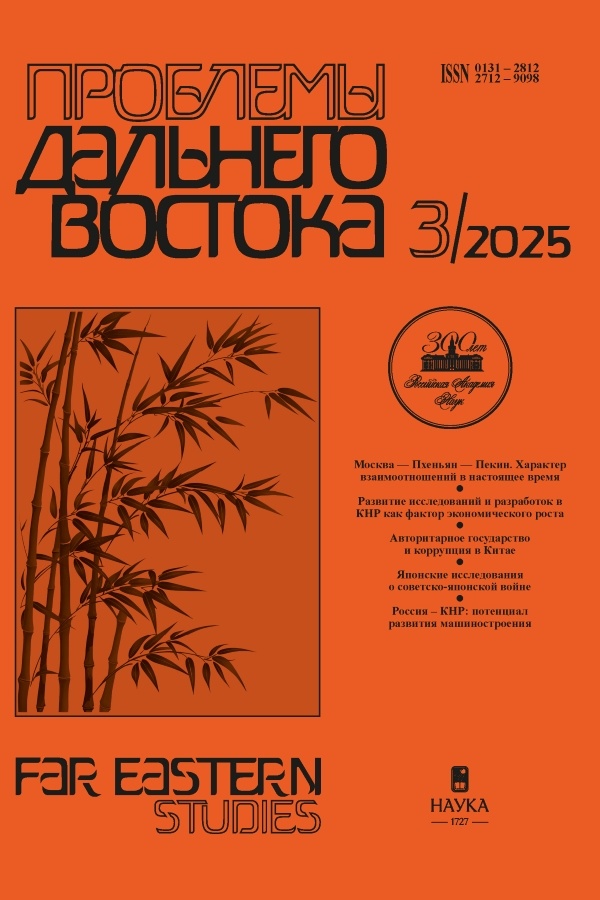Tourism, Buddhism, Socialism: in Search of "Tibet Development Model"
- Авторлар: Mikhalev M.S.1
-
Мекемелер:
- Institute of China and Contemporary Asia of the Russian Academy of Sciences
- Шығарылым: № 3 (2025)
- Беттер: 82-93
- Бөлім: State and society
- URL: https://ter-arkhiv.ru/0131-2812/article/view/688440
- DOI: https://doi.org/10.31857/S0131281225030065
- ID: 688440
Дәйексөз келтіру
Аннотация
This paper elaborates on the recent trends in social and economic development of China’s Tibet in the context of the two opposing narratives, created and promoted by the government of PRC and Central Tibet Administration. While the former stresses out the economic and social achievements of the central government during the last seventy years, the latter tries to play them down by insisting that Tibetans need only religious freedoms. As it turns out, however, the compromise between these two narratives is reachable thanks to recent rise of tourism in Tibet. From one side, it creates wealth and promotes economic development. From another side, this development becomes possible only in case religious freedoms exist. Drawing on examples from other regions of China, where such sort of cultural tourism has been developing for a certain period of time, this paper warns that the above scenario has its own pitfalls. Selling religious tradition can cause its secularization that in turn leads to marginalization of local people. It is suggested that by strictly adhering to the principles of Chinese that implies priority of the common interests over the individual ones can prevent this scenario. This paper concludes that combination of tourism, Buddhism and socialism can create a new, unique Tibet development model.
Негізгі сөздер
Авторлар туралы
Maxim Mikhalev
Institute of China and Contemporary Asia of the Russian Academy of Sciences
Email: maxmikhalev@yahoo.com
Dr.Sc.(History), Chief Researcher Moscow, Russian Federation
Әдебиет тізімі
- Гарри И.Р. Религиозная ситуация в Тибетском автономном районе КНР // Религиоведение. 2009.№ 4. С. 52–63.
- Гарри И.Р. «Тибетский вопрос» и тибетский буддизм в Китае: реформы и конфликты // Государство, религия, церковь в России и за рубежом. 2016. № 4. С. 148–173. doi: 10.22394/2073–7203– 2016–34–4–148–173
- Заклязьминская Е.О. Туристическая отрасль в стратегии развития Китая. М.: ИМЭМО РАН, 2021. 234 с.
- Михалев М.С. Этнокультурный туризм и судьба традиционной культуры народов Алтая // Востоковедные исследования на Алтае. 2021. Выпуск XV. С. 7–10.
- Москалева Н.Н. Конструирование метанарратива независимости в газете «Зеркало Тибета» в 1950– 1960-е гг.: в 2 т. Дис… канд. истор. наук: 5.6.2. Т. 1. СПб., 2023. 520 с.
- Селищев А.С. Социально-экономическое развитие Тибета в 13-й пятилетке (2016–2020 гг.) // Российско-китайские исследования. 2024. Т. 8. № 3. С. 175–192. doi: 10.17150/2587– 7445.2024.8(3).175–192
- Селищев А.С. Социально-экономическое развитие Тибета в 14-й пятилетке (2021–2025 гг.) // Российско-китайские исследования. 2024. Т. 8. № 4. С. 273–289. doi: 10.17150/2587– 7445.2024.8(4).273–289
- Тибет не был частью Китая, Политика Срединного пути остается единственным эффективным решением / Пер. Т. Морозова. М.: Эдитус, 2016. 58 с.
- Цендина А.…И страна зовется Тибетом. История, религия, быт и нравы Страны снегов. М.: Ломоносов, 2024. 256 с.
- Чжан Би Юй. Туризм в экономике Тибетского автономного района // Азия и Африка сегодня. 2014. № 10. С. 44–47.
- CPC Policies on the Governance of Xizang in the New Era: Approach and Achievements // The State Council of the People’s Republic of China. November 10, 2023. URL: https: //english.www.gov.cn/archive/whitepaper/202311/10/content_WS654db703c6d0868f4e8e120d.html (дата обращения: 05.05.2025).
- Hou Yuxin. The analysis of current situation of Tuva people in China // Новые исследования Тувы. 2014. No. 1. URL: https: //www.tuva.asia/journal/issue_21/6984-hou.html (дата обращения: 05.05.2025).
- Lopez D.S., Jr. The Prisoners of Shangri-La. Tibetan Buddhism and the West. Chicago: The University of Chicago Press, 2018. 283 p.
- Thondup G., Thurston A.F. The Noodlemaker of Kalimpong. The Untold Story of My Struggle for Tibet. Gurgaon: Random House, 2016. 353 p.
- 陈家晃, 付挺刚: 康巴藏区藏传佛教文化旅游资源及其保护性开发刍 [Чэнь Цзяхуан, Фу Тинган. Туристические ресурсы тибетского буддизма Кама и их бережное развитие] // 红河学院学报. 2018年. 第1期. 第38–42页.
- 关丙胜: 族群的演进博弈——中国图瓦人研究 [Гуань Биншэн. Большая игра этнического развития — исследования тувинцев Китая]. 北京: 社会科学文献出版社. 2011年. 380页.
- 王亚欣, 李泽锋: 西藏藏传佛教文化旅游游客的动机和满意度研究 [Ван Ясинь, Ли Цзэфэн. Исследования мотивации и удовлетворенности туристов от религиозно-культурного туризма в Тибете] // 经济管理. 2013年. 第4期. 第125–132页.doi: 10.19616/j.cnki.bmj.2013.04.015
Қосымша файлдар









